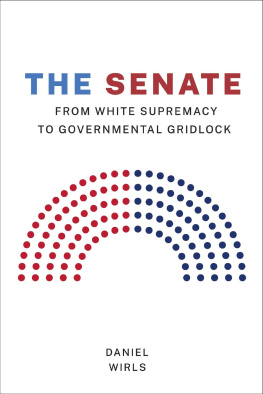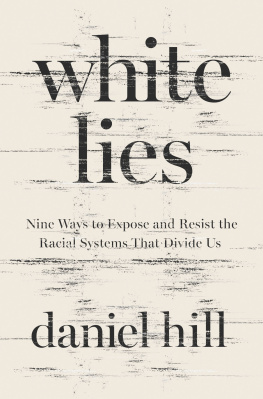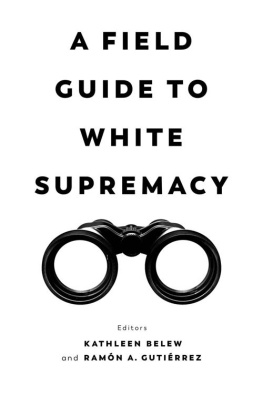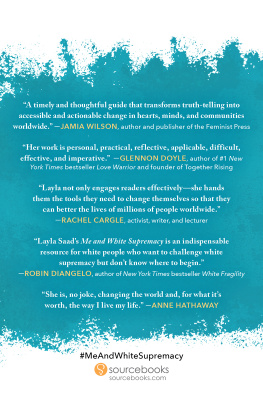The Senate
Constitutionalism and Democracy
Gregg Ivers and Kevin T. McGuire, Editors
The Senate
From White Supremacy to Governmental Gridlock
Daniel Wirls
University of Virginia Press Charlottesville and London
University of Virginia Press
2021 by the Rector and Visitors of the University of Virginia
All rights reserved
First published 2021
Library of Congress Cataloging-in-Publication Data
Names: Wirls, Daniel, author.
Title: The Senate : from white supremacy to governmental gridlock / Daniel Wirls.
Description: Charlottesville : University of Virginia Press, 2021. | Series: Constitutionalism and democracy | Includes bibliographical references and index.
Identifiers: LCCN 2021014324 (print) | LCCN 2021014325 (ebook) | ISBN 9780813946894 (hardcover) | ISBN 9780813946900 (paperback) | ISBN 9780813946917 (ebook)
Subjects: LCSH: United States. Congress. SenateHistory. | United StatesRace relationsPolitical aspectsHistory. | White supremacy movementsPolitical aspectsUnited StatesHistory. | Representative government and representationUnited States. | DemocracyUnited States.
Classification: LCC JK1161 .W573 2021 (print) | LCC JK1161 (ebook) | DDC 328.73/071dc23
LC record available at https://lccn.loc.gov/2021014324
LC ebook record available at https://lccn.loc.gov/2021014325
Cover art: Nathaniel Roy/Notch Design
Contents
In small ways, this book has been in progress since Stephen Wirls and I wrote The Invention of the United States Senate, which was published in 2004. That volumes examination of the Senate stopped in the early 1800s. Two books and other projects on unrelated subjects delayed my intended evaluation of the contemporary Senate in light of its creation and development. Over the years, however, research proceeded, along with the publication of a few articles on specific aspects of the book as it evolved. I was finally able to turn most of my attention to this project in the last few years as the Senate itself seemed to become increasingly a subject of news and controversy, culminating in its role during the Trump administration.
Along the way, a host of undergraduate research assistantsall but one of whom came from the ranks of our amazing politics majors at the University of California, Santa Cruzmade vital contributions. I am deeply grateful to Kylie Carpenter, Jannet Ceja, Nick Draper, Lindsey Hutchison (via a Smith College summer program), Ivan Huynh, Sawyer Labbe, Jessica Matlock, Frances Maurer, Marleena Sonico, and Jessica Xu. Two UC Santa Cruz Ph.D. students, Shawn Nichols and Trina Barton, also conducted essential and, in Bartons case, painstaking research.
Many colleagues read and commented on sections of the book as it developed, doing their best to impart their wisdom as I tried to shape the parts into a whole. These friends and colleagues include Gwen Alphonso, Sarah Binder, Gerald Gamm, Matt Green, Tyler Hughes, Frances Lee, and Elizabeth Sanders. My thanks to Greg Koger for sharing his data set on supermajority votes in the Senate. I have to single out David Siemers and Sean Theriault for their extensive comments and sage advice on the penultimate draft of the manuscript; the book is much better for their efforts. Anonymous reviewers gave detailed feedback at other stages. Colleagues in the Politics Department at UC Santa Cruz, including Eva Bertram, Kent Eaton, and Dean Mathiowetz, provided feedback and support. Part of the research involved a series of interviews in 2013 with mostly current and a few former senior Senate staff, focusing on how things worked in the contemporary sixty-vote Senate in an era of partisan polarization. Many thanks to Jeremiah Baumann, Jack Danielson, Bill Dauster, Steven Duffield, Alan Frumin, Rohit Kumar, Sean Moore, Galen Roehl, Thomas Ross, Shannon Smith, and James Wallner for taking the time to talk to me and share their insights. Ruth Talbot took time out of her busy schedule to transform and refine the books graphics; I was fortunate to benefit from her considerable talents at a crucial time in the books preparation.
Thanks to UC Washington Center for providing a home away from home to teach about Congress and conduct research, and to UC Santa Cruz for its generous sabbatical policy, which allowed me to finish a draft of the manuscript during the 201718 academic year. My biggest debt of gratitude is owed to Nadine Zimmerli, editor extraordinaire at the University of Virginia Press. More than anyone else, Nadine is responsible for this books improvement and completion, from her initial interest in the project to her detailed, trenchant, and timely edits of the entire manuscript. My thanks and appreciation to Marjorie Pannell for her expert editorial work and to the rest of the team at the Press.
This book was heading to the finish line as granddaughter Zadie Talbot Schindler came into the world to join the family and brighten our days. And so this book is dedicated to Zadie and her adoring parents, Steven and Zeneva, along with the rest of her loving clan, including Aunt Ruth and Grandma Alice.
The Senate
The Senate and American Democracy
Living Father, revive the Senate. Infuse it with new life. Dissolve the frustration, the disappointment, the disenchantment. Ignite the fire that burned in the Senators hearts when first they convinced the people to send them here. Restore the faith, the sense of purpose, the enthusiasm, the dream, the vision. Mighty God, from whom comes all authority, the world waits for the Senate to be the powerful, intelligent, deliberative, legislative leaders so desperately needed today in the Nation and the world. Let it be true, dear Lord. Let it be true. In Jesus name. Amen.
T HE R EVEREND R ICHARD C . H ALVERSON , Senate chaplain, opening prayer, July 11, 1994
The Reverend Halversons prayer was never answered. Although it sought a renewed sense of purpose, enthusiasm, and vision from senators as individuals, his supplication asked for an institution that never was and never could be. In the years following this prayer, things only got worse for the Senate, and that was no accident or act of God.
In the wake of everything that has happened since, it is easy to forget that in July 1994when the chaplain prayed for the Senate as he didthe government was, despite the initial promise of a Clinton presidency bolstered by strong Democratic majorities in both houses of Congress, in the throes of legislative gridlock, and the nation was experiencing the kind of brook-no-compromise, take-no-prisoners partisanship that would become commonplace. The Clinton presidency and the 103rd Congress were collapsing under the Republicans use of the Senate, despite a solid Democratic majority, to prevent bills from becoming lawsomething that would become a more or less fixed and bipartisan feature of the political landscape. By the mid-1990s, the Senate had become a citadel from which to thwart or impede what the other party, the House, or the president sought to accomplish.
Since at least 1994, when the Republicans, led by House Minority Whip Newt Gingrich, took control of Congress in the elections that fall, the United States has dealt with and debated its crisis of governance. With divided government, hyperpartisanship, and policy gridlock in especially sharp contrast with a dynamic environment of economic and technological change, Americans have faced increasing doubts about the capacity of their eighteenth-century political institutions to lead the nation into and through a twenty-first-century world. General uncertainties and concerns have found expression in a variety of not particularly harmonious or consistent criticisms, criticisms that too often fluctuate with partisan electoral fortunes. There is too much government or not enough government. Excessive partisan polarization or not enough party control. Dangerous presidential power or perilous congressional gridlock and paralysis. An imperial judiciary. Too much power in Washington; too much power in state capitals. Regardless, the core of the problem is a crisis of governance, an inability of our institutions to address and solve problems. This is a self-perpetuating crisis, moreover, as failure produces frustration and more political polarization.












